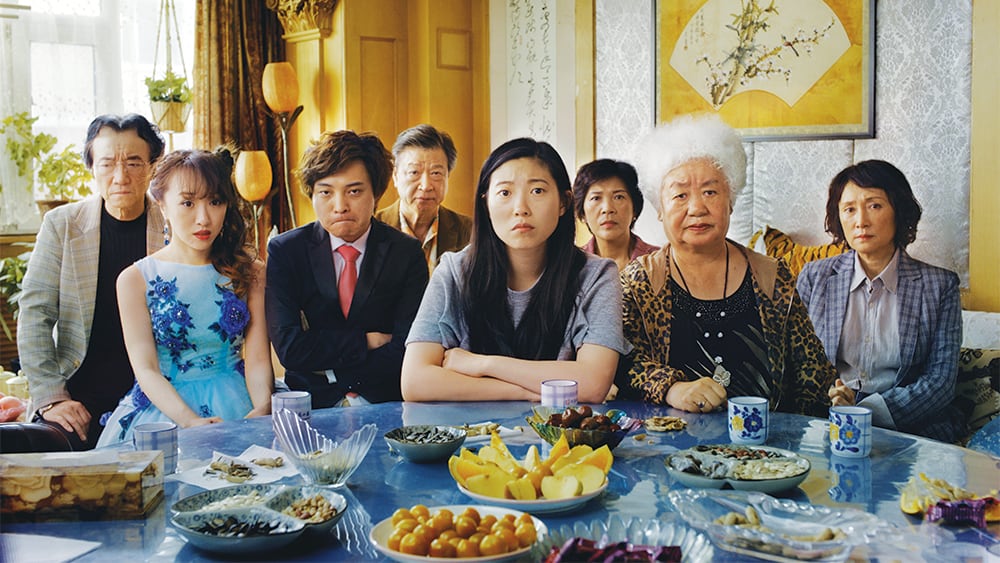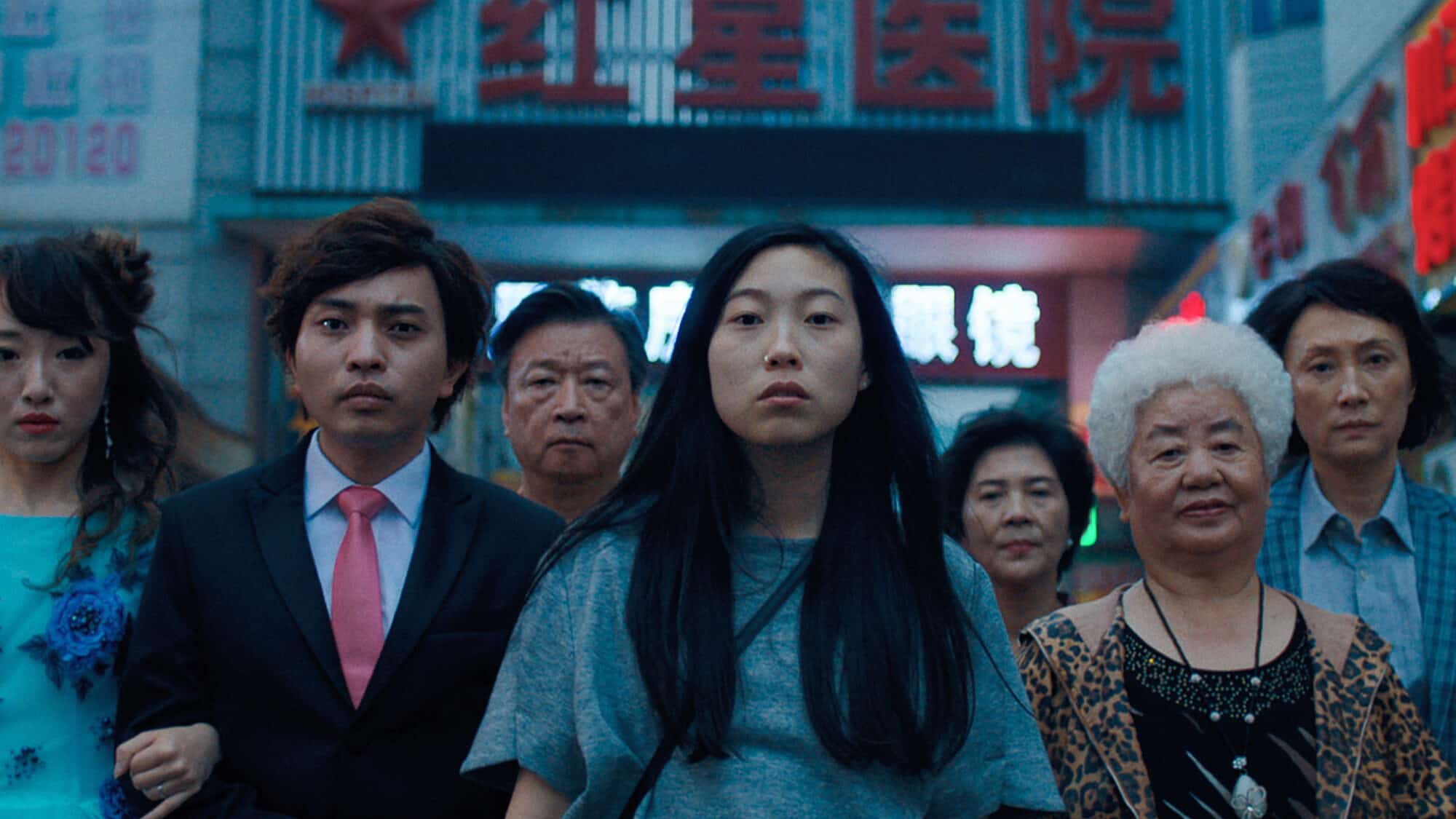Nai Nai has stage four terminal lung cancer and about three months left to live. Everyone in the family knows that. Everyone, but Nai Nai. She thinks that the persistent cough she’s been having is a leftover infection from a previous pneumonia. That the spots from her CT scan are just “benign shadows.” And that her grandson Hao Hao’s recent wedding announcement is exactly that—a wedding. What she doesn’t know is that her family has decided to keep her terminal diagnosis from her and is using Hao Hao’s wedding as an excuse for family members scattered around the world to return to China and see Nai Nai for the last time.

L to R: “Jiang Yongbo, Aoi Mizuhara, Chen Han, Tzi Ma, Awkwafina, Li Xiang, Lu Hong, and Diana Lin.” Courtesy of Big Beach.
This is the premise of Lulu Wang’s The Farewell, which centres a Chinese family whom, in accordance with a longstanding Chinese tradition, makes the executive decision to withhold the truth of Nai Nai’s illness from her, in hopes that she can live out the rest of her life without the painful knowledge of her impending death. As much as the film is about a final farewell to a beloved grandmother then, self-evident in its English title—The Farewell—it is also equally about deception. The Chinese title of the film is a clever nod to that theme—别告诉她, which translates to Don’t Tell Her.
While the decision to keep Nai Nai’s illness a secret from her is made consensually with most of the family members, it does not go without challenge from a certain granddaughter with a liberal belief system of her own. Billi is a Chinese-American in her thirties residing in New York City, having immigrated there with her parents more than twenty years ago. Straddling two vastly distinct cultures—Chinese and American—she is uniquely positioned to offer the audience an Americanised perspective on (what she perceives as) the confusing customs of the Chinese world. Through Billi, who does not understand why Nai Nai cannot know the truth of her condition and repeatedly questions the people around her about the morality behind the decision, the film introduces and explores the two opposing perspectives on the issue.
Out of the five times the question of telling Nai Nai is raised, Billi is responsible for four of them. We see her protesting the decision again and again, bringing the question up to her parents, her Aunt, her Uncle, and even the doctor who treats Nai Nai. She rehashes the same question:
“She doesn’t have a lot of time left. She should know, right?”
“Don’t you think we should tell Nai Nai?”
“Are you going to tell her?”
“Don’t you think it’s wrong to lie?”

L-R: “Aoi Mizuhara, Chen Han, Tzi Ma, Awkwafina, Li Xiang, Lu Hong, and Diana Lin”.” Credit: A24 Films
Coming in with a Westernised point of view, Billi voices out what some of us are thinking: Isn’t it Nai Nai’s right to know? Isn’t it illegal not to tell her? What if she has things she wants to take care of? To say goodbye? To these questions, we receive some answers from the Chinese viewpoint:
Billi’s mother explains that Chinese people have a saying, “When people get cancer, they die. It’s not the cancer that kills them, it’s the fear.” Billi’s Aunt is matter-of-fact and tells her plain that it’s too painful for Nai Nai to say goodbye and the news of her illness might ruin her good mood. The doctor justifies the lie by saying that it is a “good lie,” a compassionate one to spare her the truth and allow her to enjoy the remainder of her life. But it is Uncle Haibin’s monologue-answer, delivered with such authority, that is the most impactful and which ultimately convinces Billi to stop questioning the family’s decision. He says:
You know Billi. You need to understand something. You guys moved to a Western country a long time ago, so you’re no longer connected to the Eastern way of looking at things. In America, you think one’s life belongs to oneself. But that’s the difference between the East and the West. In the East, your life is part of a whole. Family. Society. You want to tell Nai Nai the truth because you feel too much responsibility carrying it. If you tell her, then you don’t have to feel guilty anymore. We’re not telling her because it is our responsibility to carry this emotional burden for her.
And with that, Billi tacitly agrees to keep the secret and the wedding proceeds smoothly as planned. Resembling a pre-death funeral for her, the wedding is a teary one with a eulogy-like tribute made to Nai Nai by Uncle Haibin. Having had to suppress their grief the entire time leading up to the occasion, Uncle Haibin and Hao Hao use the wedding as an opportunity for emotional catharsis. The two take turns to cry uncontrollably, passing tears of sadness as tears of joy.
As we watch the movie, it is hard not to imagine ourselves in Billi’s position. Would we tell? In the end, the film passes no judgement on which paradigm—Eastern or Western, collectivist or individualist—is right or wrong. Rather, it implores us to understand where each side is coming from and learn the cultural reasonings behind it. To tell or not to tell? This is a difficult question with no straightforward answer and Wang does not attempt to give one to us. If there is a message at all in the film, it appears to be cultural relativism: resisting our impulse to judge a foreign culture by the standards of our own.
